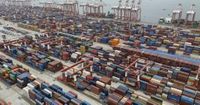The ongoing trade war between the United States and China is beginning to show its effects on international trade, with potential repercussions for consumers in both countries. New data from Vizion, a container shipment tracking company, indicates a significant decline in cargo shipments between China and the U.S. as businesses seek to circumvent hefty tariffs imposed by the Trump administration. Currently, U.S. President Donald Trump’s tariff policy imposes a staggering 145 percent duty on all imports from China, while China retaliates with a 125 percent tariff on American products.
According to Santo Ligotti, a representative from the Retail Council of Canada, the financial implications of these tariffs are immense. "If you have $100 million in Chinese goods in a container at the port of Los Angeles, you have to pay $145 million to have them released. Those are monstrous sums," Ligotti explained. He cautioned that as these tariffs lead to a decrease in imports, U.S. consumers will soon face shortages or price increases due to the tariffs.
Despite the seemingly isolated nature of these trade tensions, experts warn that the impact may ripple through to other nations, including Canada. Matt Poirier, vice-president of federal government relations at the Retail Council of Canada, emphasized the interconnectedness of the global economy. "Even though we’re not part of that fight, we’re in the ring with them," he stated.
Canadian businesses that rely on U.S. suppliers may experience rising costs if those suppliers are affected by tariffs, especially if their components are sourced from China. Pascal Chan from the Canadian Chamber of Commerce noted that the first quarter of 2025 saw a boost in trade as businesses rushed to stockpile goods in anticipation of these tariffs. "Given the interconnected nature of our supply chains, there’s a very good chance that, sooner rather than later, the costs for Canadian and American consumers will rise," Chan warned.
Currently, store shelves appear well-stocked, but Chan explained that this is due to companies filling their warehouses before the tariffs took effect. "The knock-on effects of turbulent tariff changes can only be held off for so long," he said. Experts predict that as stockpiles diminish, supply chain shortages may become a reality.
Bruce Rodgers from the Canadian International Freight Forwarders Association echoed this sentiment, stating, "I think that it will vary, but you’re not going to see the widespread shortage of goods in the near term. But that could be forthcoming at some point in time." As trade talks between China and the U.S. continue, businesses remain in a holding pattern, waiting for any sign of tariff relief.
In a separate but related issue, France's Culture Minister Rachida Dati expressed confidence in the face of Trump’s threats to impose tariffs on foreign films. Speaking at a cocktail event in Paris, Dati stated, "I have nothing to fear from the U.S. president's threat to impose tariffs on movies produced abroad," defending France’s long-standing financial support for its film industry. She added, "In the end, the American film industry would be penalized the most, and obviously not ours."
The potential tariffs on foreign films are part of Trump’s broader strategy to protect American industries, which has been met with significant pushback from various sectors, including the film industry. Dati's remarks highlight the ongoing tensions in cultural trade and the implications of such tariffs on international collaborations.
Meanwhile, Ford Motor Company has taken proactive measures in response to the tariffs, recently hiking prices on three of its Mexico-produced models, including the Mustang Mach-E, Maverick pickup, and Bronco Sport. Effective May 2, 2025, prices on some models will increase by as much as $2,000. Ford has estimated that Trump’s trade war will add about $2.5 billion in costs for 2025, although it anticipates reducing that exposure by around $1 billion.
General Motors (GM) has also reported that tariffs are projected to cost the company between $4 billion and $5 billion, although it expects to offset at least 30% of these costs. A Ford spokesperson indicated that while the price hikes reflect usual mid-year adjustments, they are also a response to the tariffs. "We have not passed on the full cost of tariffs to our customers," the spokesperson clarified.
Despite the challenges posed by tariffs, Ford is still running a discount program through the July 4 weekend on many of its models. Analysts have noted that U.S. auto sales could drop by more than one million vehicles a year if tariffs remain in place, putting additional pressure on manufacturers.
In contrast, BMW’s chief executive, Oliver Zipse, has predicted that Trump’s import tariffs on foreign cars will be lowered this summer. BMW reported a profit drop of 25% for the first quarter of 2025, attributing some of this decline to the ongoing trade war. Zipse stated that he expects tariffs to decrease as the costs are too high for all parties involved. "In trade conflicts, nobody wins. All sides should avoid a spiral of isolation and trade barriers," he urged.
Zipse also mentioned that BMW has experienced minimal impact from the steep U.S. tariffs on China and the subsequent retaliatory measures. The company imports some models from China, but the U.S. factory in Spartanburg, South Carolina, makes BMW the largest automotive exporter from the U.S. by value.
As the trade landscape continues to evolve, U.S. President Trump has also turned his attention to Canada’s film industry, ordering the U.S. Department of Commerce to initiate a process for imposing a 100% tariff on movies produced outside the United States. This move has sparked outrage among Canadian labor representatives, who argue that it threatens jobs and the recovery of the Canadian production industry.
Unifor National President Lana Payne criticized the tariff threats, stating, "This is an attack on one of Canada’s key cultural and economic sectors, and it’s nothing short of outrageous." The uncertainty surrounding these tariffs raises concerns about the future of the film industry in Canada, particularly as U.S. trade officials may also target Canada’s Online Streaming Act.
As the global economy grapples with the ramifications of these trade tensions, it remains to be seen how consumers and industries on both sides of the border will adapt to the changing landscape. With trade talks ongoing and the potential for tariff relief, the hope is that a resolution can be reached that minimizes the impact on consumers and businesses alike.







